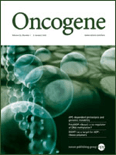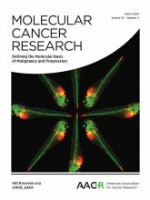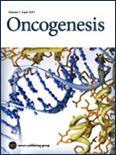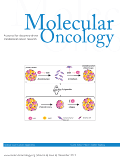
ONCOGENE
Scope & Guideline
Empowering Researchers to Combat Cancer with Knowledge
Introduction
Aims and Scopes
- Molecular Mechanisms of Cancer:
Research in this area delves into the genetic, epigenetic, and proteomic alterations that contribute to the initiation and progression of various cancers. It emphasizes understanding the roles of oncogenes, tumor suppressor genes, and signaling pathways in tumor biology. - Tumor Microenvironment and Immune Interactions:
Studies address the complex interactions between tumor cells and their microenvironment, including the role of cancer-associated fibroblasts, immune cells, and extracellular matrix components in tumor progression and therapeutic responses. - Therapeutic Resistance Mechanisms:
This theme explores how cancer cells develop resistance to standard therapies, including chemotherapy and targeted treatments. Research often focuses on identifying novel targets and strategies to overcome resistance. - Cancer Stem Cells and Metastasis:
Research focuses on the properties of cancer stem cells and their role in metastasis, emphasizing the mechanisms that enable these cells to sustain tumor growth, resist therapies, and drive metastatic spread. - Innovative Therapeutic Strategies:
The journal highlights studies on novel therapeutic approaches, including targeted therapies, immunotherapies, and combination treatments, aimed at improving clinical outcomes for cancer patients. - Clinical and Translational Research:
ONCOGENE publishes research that bridges laboratory findings with clinical applications, emphasizing studies that have the potential to translate into improved patient care and outcomes.
Trending and Emerging
- Epigenetic Regulation in Cancer:
Research increasingly emphasizes the role of epigenetic modifications, such as DNA methylation and histone modification, in cancer progression and treatment resistance, suggesting new avenues for therapeutic intervention. - Non-coding RNAs and Tumor Biology:
There is a growing focus on the roles of long non-coding RNAs (lncRNAs) and microRNAs in regulating gene expression and their implications in cancer stemness, metastasis, and therapeutic resistance. - Metabolic Reprogramming of Cancer Cells:
Emerging studies investigate how cancer cells alter their metabolic pathways to support growth and survival, with a particular focus on targeting metabolic vulnerabilities as a therapeutic strategy. - Immunotherapy and Tumor Microenvironment Modulation:
The integration of immunotherapy into cancer treatment regimens is a significant trend, with research exploring how the tumor microenvironment influences immune responses and therapeutic efficacy. - Artificial Intelligence and Machine Learning in Oncology:
The application of AI and machine learning techniques for data analysis, patient stratification, and predictive modeling in cancer is rapidly gaining traction, leading to more personalized treatment strategies. - CRISPR and Gene Editing Technologies:
Research utilizing CRISPR and other gene editing technologies to investigate gene function and develop novel therapeutic approaches is on the rise, reflecting the potential for precision medicine in oncology.
Declining or Waning
- Traditional Chemotherapy Studies:
There is a noticeable decline in studies focused solely on traditional chemotherapy agents, as research increasingly shifts toward personalized medicine and targeted therapies that consider the specific molecular profiles of tumors. - Basic Cell Culture Studies:
Research relying solely on conventional 2D cell culture models is less frequent, as more studies adopt advanced in vivo models and 3D culture systems that better mimic the tumor microenvironment. - Single Biomarker Studies:
The trend is shifting away from single biomarker studies towards multi-omics approaches that integrate various molecular data types, reflecting a more comprehensive understanding of cancer biology. - Generalized Cancer Epidemiology:
There is a decline in broad epidemiological studies lacking molecular insights, as the focus moves towards understanding specific genetic and environmental interactions that contribute to cancer.
Similar Journals

MOLECULAR CANCER RESEARCH
Unveiling Molecular Insights in OncologyMOLECULAR CANCER RESEARCH, published by the American Association for Cancer Research, stands as a pivotal journal in the fields of cancer research, molecular biology, and oncology. With an impressive impact factor and recognized as a Q1 journal in its respective categories for 2023, it serves as an essential resource for researchers, professionals, and students aimed at advancing our understanding of cancer mechanisms and therapies. The journal, identified by the ISSN 1541-7786 and E-ISSN 1557-3125, provides a platform for cutting-edge research and clinical applications, emphasizing innovation and collaboration within the scientific community. With its focus on high-quality, peer-reviewed articles, MOLECULAR CANCER RESEARCH is vital for anyone looking to stay abreast of significant advancements in cancer biology and treatment strategies. For more details and to access the journal's content, please visit the publisher's link.

Advances in Cancer Biology-Metastasis
Pioneering Pathways in Cancer Research.Advances in Cancer Biology-Metastasis is an emerging journal published by Elsevier, aimed at advancing our understanding of the complexities of cancer biology, with a specific focus on the mechanisms and pathways related to metastasis. With an E-ISSN of 2667-3940, this journal offers a platform for researchers, professionals, and students in the fields of Cancer Research and Cell Biology to disseminate innovative findings and discuss novel therapeutic approaches. Though currently classified in the Q4 quartile across both Cancer Research and Cell Biology categories, the journal aspires to enhance its impact through rigorous peer review and high-quality publication. Positioned to cover the years from 2021 to 2024, it seeks to bridge gaps in foundational knowledge and promote collaborative research efforts that could pivot the current understanding of cancer metastasis. Researchers are encouraged to take advantage of this platform to advocate for advancements in cancer biology, making significant contributions that can influence both academic and clinical practices.

NEOPLASIA
Advancing oncology through innovative research.NEOPLASIA is an esteemed open-access journal dedicated to advancing the field of oncology, published by Elsevier Science Inc. since 1999. With an impressive impact factor and recognition as a Q1 journal in Cancer Research for 2023, it holds a significant position within the scientific community, specifically ranking in the 74th percentile globally in the categories of Biochemistry, Genetics, and Molecular Biology. NEOPLASIA seeks to provide a comprehensive platform for innovative research, covering a wide array of topics in cancer biology, treatment methodologies, and therapeutic advancements. Researchers, professionals, and students are encouraged to utilize this resource, which is easily accessible to foster collaboration and stimulate progress in cancer research. As it converges its efforts towards the future of oncology, this journal is poised to remain at the forefront of transformative discoveries that shape our understanding and treatment of cancer.

JOURNAL OF EXPERIMENTAL & CLINICAL CANCER RESEARCH
Elevating the standards of cancer research and treatment.The JOURNAL OF EXPERIMENTAL & CLINICAL CANCER RESEARCH, published by BMC, is a leading open-access journal dedicated to advancing the field of cancer research and oncology. Since its inception in 1982, this esteemed journal has fostered innovation and collaboration in the scientific community, as evidenced by its outstanding impact factor and position in the Q1 quartile for both Cancer Research and Oncology categories in 2023. With a proud commitment to disseminating high-quality research, the journal operates under an open-access model, ensuring that findings are readily accessible to researchers, healthcare professionals, and students worldwide. The journal has established a distinguished reputation, ranking 23rd out of 404 in Medicine oncology and 16th out of 230 in Biochemistry, Genetics, and Molecular Biology (cancer research), showcasing its importance and influence in guiding the future of cancer treatment and research. With the aim of bridging experimental and clinical research, this journal invites submissions that push the boundaries of our understanding of cancer biology and therapy.

Cancer Communications
Fostering Global Collaboration in Cancer ScienceCancer Communications, published by WILEY, is a leading open-access journal that has positioned itself at the forefront of cancer research and oncology since its inception in 2017. With an impressive HIndex reflective of its scholarly impact and recognized in the Q1 category for both Cancer Research and Oncology as of 2023, this journal consistently ranks in the top echelons of its field, specifically at Rank #16/404 and Rank #13/230 in their respective categories on Scopus. Cancer Communications aims to disseminate cutting-edge research findings, innovative methodologies, and significant advancements in cancer treatments, thereby fostering a deeper understanding of oncology among researchers, healthcare professionals, and students. The journal operates under an Open Access model since 2018, ensuring that vital research is accessible to a global audience, thus enhancing collaboration and knowledge sharing necessary to tackle one of the most pressing health challenges of our time. Located in Hoboken, NJ, United States, and with a strong commitment to scientific excellence, Cancer Communications remains an essential resource for anyone engaged in the fight against cancer.

Oncogenesis
Innovating insights into the biology of cancer.Oncogenesis is a prestigious open access journal, published by SpringerNature, dedicated to advancing our understanding of cancer biology and molecular mechanisms of oncogenesis. Since its inception in 2012, this journal has quickly established itself as a leading platform for innovative research, being ranked in the Q1 quartile in both Cancer Research and Molecular Biology categories for 2023. With an admirable impact factor that reflects its exceptional quality, Oncogenesis is indexed in Scopus, holding notable rankings in both Molecular Biology and Cancer Research, placing in the 87th and 83rd percentile respectively. The journal not only facilitates the dissemination of groundbreaking research but also encourages collaboration among scientists and healthcare professionals across the globe. By offering open access to its articles, Oncogenesis ensures that vital findings reach a diverse audience, fostering a deeper dialogue and understanding in the fight against cancer. Based in the United States but with a global reach, the journal remains committed to publishing high-impact studies that contribute to the advancement of knowledge in the realms of oncology, biochemistry, and genetics.

Molecular Oncology
Catalyzing Collaboration in Molecular Oncology.Molecular Oncology, published by WILEY, is a premier open-access journal that has been at the forefront of cancer research since its inception in 2007. With an impressive impact factor reflective of its outstanding contribution to the field, it holds a prestigious position in the Q1 category across multiple disciplines, including Cancer Research, Genetics, and Molecular Medicine. This journal is essential for researchers and professionals seeking to publish high-quality findings in a rapidly evolving area of study, underscored by its significant Scopus rankings that place it within the top percentiles of Oncology and Molecular Biology. As an open-access journal since 2017, it ensures that vital research is readily available to a global audience, thereby facilitating collaboration and knowledge dissemination among academic and clinical communities. With its commitment to innovative and impactful research, Molecular Oncology continues to be a critical resource for advancing our understanding of cancer biology and treatment.

CELLULAR ONCOLOGY
Exploring Breakthroughs in Cellular Cancer StudiesCELLULAR ONCOLOGY is an esteemed open access journal published by SPRINGER since 2004, specializing in the dynamic field of oncological research. With its ISSN 2211-3428 and E-ISSN 2211-3436, this journal plays a pivotal role in disseminating cutting-edge findings and innovative methodologies that address cancer at the cellular level. The journal has consistently achieved high-impact recognition, currently holding a Q2 rating in Cancer Research and Q1 rankings in Medicine (miscellaneous), Molecular Medicine, and Oncology as of 2023. Furthermore, it ranks 56th in oncology medicine and 48th in cancer research according to Scopus, placing it firmly within the top echelons of its field. Published in the Netherlands, with an aim to connect scientists, clinicians, and practitioners worldwide, CELLULAR ONCOLOGY fosters a collaborative environment for researchers to share insights, enhance understanding, and advance treatments. The journal’s open access model ensures that ground-breaking research is freely available, facilitating greater visibility and impact within the scientific community and beyond.

Cancer Cell International
Connecting Researchers to Combat CancerCancer Cell International, published by BMC, is a transformative open-access journal established in 2001, dedicated to advancing the field of oncology and cancer research. With its ISSN number not specified and an E-ISSN of 1475-2867, the journal proudly operates from the United Kingdom, located at CAMPUS, 4 Crinan St, London N1 9XW, England. Renowned for its rigorous peer-review process, Cancer Cell International has made significant strides, securing a Q2 ranking in Cancer Research and Q1 rankings in both Genetics and Oncology as of 2023. It ranks impressively in Scopus, featuring in the top quintile of Genetics (#37/347) and Oncology (#52/404), indicating its importance within the scientific community. The journal's broad scope caters to a diverse array of topics within cancer biology, making it an invaluable resource for researchers, professionals, and students seeking to stay at the forefront of cancer science. With a commitment to disseminating high-quality research, Cancer Cell International invites scholars to explore innovative findings and contribute to the collective effort of combating cancer.

Cancer Research Communications
Fostering innovation in cancer prevention and therapy.Cancer Research Communications is an esteemed journal published by the American Association for Cancer Research, a leading organization in the field of oncology. This journal aims to advance knowledge in cancer research through the dissemination of high-quality, peer-reviewed articles that cover a wide range of topics related to cancer biology, treatment modalities, and prevention strategies. As an open-access journal, Cancer Research Communications ensures that vital research findings are accessible to a global audience, promoting collaboration and innovation within the scientific community. The journal serves as a crucial platform for researchers, professionals, and students to share their insights and foster the exchange of effective cancer therapies and methodologies. With a commitment to excellence, it plays a significant role in shaping the future of cancer research and therapeutic development.